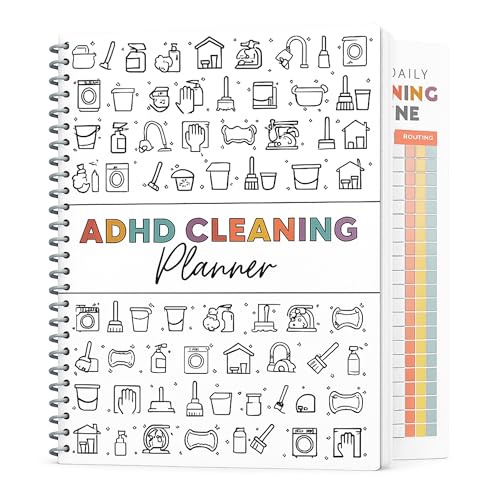To manage your household with chronic illness, create flexible routines that adjust to your energy levels and health fluctuations. Break chores into smaller tasks, prioritize what’s essential, and don’t hesitate to delegate. Incorporate visual aids or technology to stay organized and set reminders. Focus on progress rather than perfection, and practice self-compassion. Building emotional resilience and seeking support can make a big difference. Keep exploring strategies to find what works best for you.
Key Takeaways
- Develop flexible, adaptable routines that account for energy and mobility fluctuations, prioritizing essential tasks first.
- Break household chores into smaller, manageable steps and delegate responsibilities when possible.
- Use visual aids and technology like projectors or reminders to organize routines and ensure consistency.
- Focus on one task at a time to prevent overwhelm, allowing for rest and self-compassion during bad days.
- Build a support network and leverage community resources to share responsibilities and maintain a sustainable household routine.

Living with a chronic illness can substantially impact how you manage your household, but with careful planning and support, it’s possible to maintain a balanced and functional home. One of the most effective strategies is adaptive planning. Instead of rigid routines that don’t account for days when energy or mobility are limited, you learn to create flexible schedules. This means breaking chores into smaller, manageable tasks and prioritizing what’s most important. For example, instead of trying to clean the entire house in one go, you might focus on tidying up one room each day or delegating certain tasks to family members. Adaptive planning helps you adapt to your daily fluctuations, reducing stress and preventing overwhelm, which is essential when living with a chronic illness. Incorporating tools like projectors or visual aids can also help in organizing your routines and setting reminders. Building emotional resilience is equally important. Living with ongoing health challenges can sometimes be emotionally taxing, making it harder to stay motivated or optimistic. You develop emotional resilience by cultivating a positive mindset, practicing self-compassion, and seeking support when needed. This might involve talking to a counselor, joining support groups, or simply sharing your feelings with trusted friends or family. Resilience also means celebrating small victories—whether it’s successfully completing a household task or simply having a good day. Recognizing these moments fuels your motivation and helps you bounce back from setbacks. Over time, you’ll find that a resilient mindset enables you to handle household responsibilities with greater patience and confidence. Incorporating adaptive planning and emotional resilience into your routine requires ongoing adjustment. Some days, you might need to shift priorities or accept help more readily. It’s important to remember that managing a household with a chronic illness is not about perfection but about creating sustainable routines that support your well-being. You can set realistic goals, such as preparing simple meals or maintaining a clutter-free space without overextending yourself. Building a network of support—whether through family, friends, or community resources—further eases the burden and provides a safety net when your energy dips or symptoms flare. Additionally, utilizing home technology like projectors or smart devices can help streamline daily tasks and enhance your living environment.

Aleric 4 Pieces Chores Chart for Kids Chore Chart, Sliding Routine Chart to Do List, My Chores RV Checklist Task Planning Board for Kids and Adults, ADHD Tools Routine Visual Schedule Reminder
What You Will Get – There are 4 pieces chore chart for kids chore list and 10 sheets…
As an affiliate, we earn on qualifying purchases.
As an affiliate, we earn on qualifying purchases.
Frequently Asked Questions
How Can I Involve Family Members in Household Chores?
To involve family members in household chores, encourage family cooperation by openly discussing responsibilities. Use chore delegation to assign specific tasks based on each person’s abilities, making sure everyone feels valued. Create a simple schedule or checklist, so chores are clear and manageable. Regularly check in to adjust duties as needed, fostering teamwork and shared responsibility, which helps lighten your load and keeps the household running smoothly.
What Are Effective Ways to Manage Medication Schedules?
To manage medication schedules effectively, prioritize medication adherence by setting reminders on your phone or using a pill organizer. Choose a pill organizer with compartments for each dose to keep things clear and organized. Establish a daily routine, such as taking meds with breakfast or before bed, and involve family members if needed. Consistency helps make certain you don’t miss doses and stay on track with your treatment.
How Do I Handle Unexpected Health Flare-Ups at Home?
Imagine your home turns into a rollercoaster, and suddenly, you’re holding on tight during a health flare-up. You can’t control the ride, but you can brace yourself. Build emotional resilience by staying calm and using stress management techniques like deep breathing. Keep a flare-up kit handy, stay flexible, and remember, you’re stronger than the chaos. This way, you handle surprises with grace, not panic.
What Support Resources Are Available for Caregivers?
You can find support resources like community support groups and online forums where caregivers share advice and encouragement. Professional assistance is also available through healthcare providers, social workers, or counseling services that offer guidance tailored to your needs. Don’t hesitate to reach out to local organizations or national helplines for additional help. These resources can ease your stress and help you navigate caregiving more effectively.
How Can I Maintain Social Connections While Managing Illness?
You can stay connected by joining virtual support groups and online communities related to your interests or illness. These platforms let you share experiences, seek advice, and build relationships without leaving home. Make a habit of scheduling regular online chats or participating in webinars. This way, you maintain social connections, gain support, and reduce feelings of isolation, all while managing your illness effectively.

Amazon Echo Show 15 (newest model), Full HD 15.6" kitchen hub for home organization, with built-in Fire TV, Designed for Alexa+
MEET THE ALL-NEW ECHO SHOW 15 – A stunning 15.6" Full-HD (1080p) smart display that's perfect for your…
As an affiliate, we earn on qualifying purchases.
As an affiliate, we earn on qualifying purchases.
Conclusion
Balancing household chores with a chronic illness isn’t easy, but with practical routines, you can regain control. Remember, it’s okay to ask for help and prioritize what truly matters. Some might think they have to do everything alone, but accepting support eases your burden and improves your well-being. By implementing simple strategies and being kind to yourself, you create a sustainable rhythm that keeps your home running smoothly without overwhelming you.

RMS Long Reach Comfort Wipe – Self Assist Toilet Aid, Ideal Daily Living Bathroom Aid for Limited Mobility
The RMS Comfort Wipe is 15" Long and is an ideal solution to personal hygiene when reaching is…
As an affiliate, we earn on qualifying purchases.
As an affiliate, we earn on qualifying purchases.

ADHD Cleaning Planner for Adults – Undated Daily, Weekly & Monthly Cleaning Schedule & Checklist – Household Chores Organizer Notebook for Home Management, Routine Tracking & Family Cleaning Tasks
🧠 Designed for ADHD & Busy Lifestyles Created with clear, structured layouts that simplify overwhelming tasks into small,…
As an affiliate, we earn on qualifying purchases.
As an affiliate, we earn on qualifying purchases.










